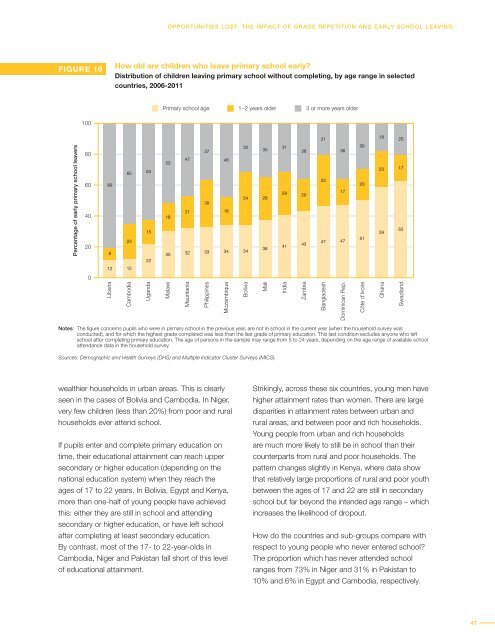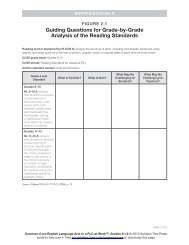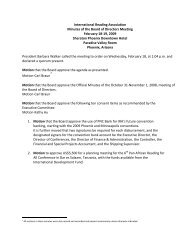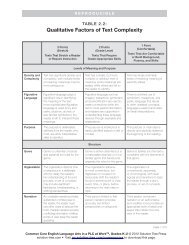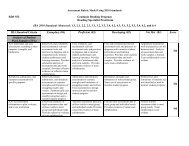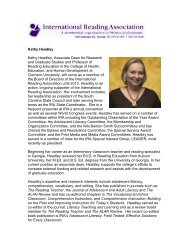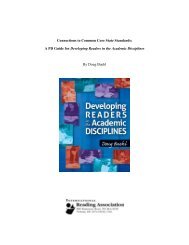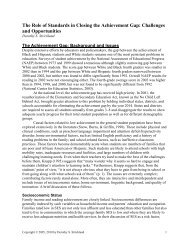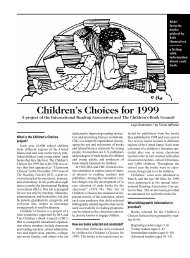Global Education Digest 2012 - International Reading Association
Global Education Digest 2012 - International Reading Association
Global Education Digest 2012 - International Reading Association
Create successful ePaper yourself
Turn your PDF publications into a flip-book with our unique Google optimized e-Paper software.
OPPORTUNITIES LOST: THE IMPACT OF GRADE REPETITION AND EARLY SCHOOL LEAVING<br />
FIGURE 19<br />
How old are children who leave primary school early?<br />
Distribution of children leaving primary school without completing, by age range in selected<br />
countries, 2006-2011<br />
Primary school age 1−2 years older 3 or more years older<br />
100<br />
21<br />
18<br />
20<br />
Percentage of early primary school leavers<br />
80<br />
60<br />
40<br />
20<br />
80<br />
8<br />
65<br />
23<br />
63<br />
15<br />
22<br />
52<br />
18<br />
30<br />
47<br />
21<br />
32<br />
37<br />
30<br />
33<br />
48<br />
18<br />
34<br />
32<br />
34<br />
34<br />
35<br />
28<br />
38<br />
31<br />
28<br />
41<br />
36<br />
20<br />
43<br />
33<br />
47<br />
36<br />
17<br />
47<br />
30<br />
20<br />
51<br />
23<br />
59<br />
17<br />
63<br />
12<br />
12<br />
0<br />
Liberia<br />
Cambodia<br />
Uganda<br />
Malawi<br />
Mauritania<br />
Philippines<br />
Mozambique<br />
Bolivia<br />
Mali<br />
India<br />
Zambia<br />
Bangladesh<br />
Dominican Rep.<br />
Côte d’Ivoire<br />
Ghana<br />
Swaziland<br />
Notes: The figure concerns pupils who were in primary school in the previous year, are not in school in the current year (when the household survey was<br />
conducted), and for which the highest grade completed was less than the last grade of primary education. This last condition excludes anyone who left<br />
school after completing primary education. The age of persons in the sample may range from 5 to 24 years, depending on the age range of available school<br />
attendance data in the household survey.<br />
Sources: Demographic and Health Surveys (DHS) and Multiple Indicator Cluster Surveys (MICS).<br />
wealthier households in urban areas. This is clearly<br />
seen in the cases of Bolivia and Cambodia. In Niger,<br />
very few children (less than 20%) from poor and rural<br />
households ever attend school.<br />
If pupils enter and complete primary education on<br />
time, their educational attainment can reach upper<br />
secondary or higher education (depending on the<br />
national education system) when they reach the<br />
ages of 17 to 22 years. In Bolivia, Egypt and Kenya,<br />
more than one-half of young people have achieved<br />
this: either they are still in school and attending<br />
secondary or higher education, or have left school<br />
after completing at least secondary education.<br />
By contrast, most of the 17- to 22-year-olds in<br />
Cambodia, Niger and Pakistan fall short of this level<br />
of educational attainment.<br />
Strikingly, across these six countries, young men have<br />
higher attainment rates than women. There are large<br />
disparities in attainment rates between urban and<br />
rural areas, and between poor and rich households.<br />
Young people from urban and rich households<br />
are much more likely to still be in school than their<br />
counterparts from rural and poor households. The<br />
pattern changes slightly in Kenya, where data show<br />
that relatively large proportions of rural and poor youth<br />
between the ages of 17 and 22 are still in secondary<br />
school but far beyond the intended age range – which<br />
increases the likelihood of dropout.<br />
How do the countries and sub-groups compare with<br />
respect to young people who never entered school?<br />
The proportion which has never attended school<br />
ranges from 73% in Niger and 31% in Pakistan to<br />
10% and 6% in Egypt and Cambodia, respectively.<br />
41


